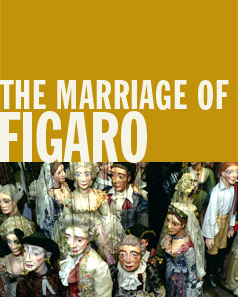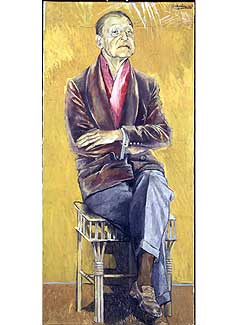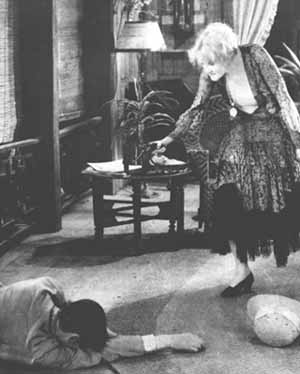I came back to New York from my last reviewing trip and found on my kitchen table a package from Subito Music, Paul Moravec‘s publisher. It contained a printed copy of the complete working draft of the piano-vocal score of The Letter, the opera that Paul and I are writing together. I’d already gone over every measure of The Letter time and again, but it’s one thing to read a score on a computer screen and another to hold in your hands a bound volume whose cover reads as follows:
Paul Moravec
THE LETTER
An Opera in Eight Scenes
Libretto by Terry Teachout
After the play by W. Somerset Maugham
What once was not quite real has become solid and touchable, and the fact that the Santa Fe Opera will be premiering The Letter a year from now seems less fantastic and more believable.
 Later this month Paul and I will fly out to Santa Fe to see four of the five productions that the company is mounting this season. One of them, The Marriage of Figaro, was staged by Jonathan Kent, the man who will be directing The Letter next summer. I stood on the stage of the Crosby Theater two months ago, but I’ve never seen an opera performed there, and Paul and I expect to make some changes in The Letter after immersing ourselves in Figaro, Falstaff, Billy Budd and Kaija Saariaho’s Adriana Mater. Once we’re finished, Subito will print a revised edition of the piano-vocal score that will be sent out to the cast and production team, and Paul will start orchestrating The Letter, a back-breaking job that will take him several months to finish.
Later this month Paul and I will fly out to Santa Fe to see four of the five productions that the company is mounting this season. One of them, The Marriage of Figaro, was staged by Jonathan Kent, the man who will be directing The Letter next summer. I stood on the stage of the Crosby Theater two months ago, but I’ve never seen an opera performed there, and Paul and I expect to make some changes in The Letter after immersing ourselves in Figaro, Falstaff, Billy Budd and Kaija Saariaho’s Adriana Mater. Once we’re finished, Subito will print a revised edition of the piano-vocal score that will be sent out to the cast and production team, and Paul will start orchestrating The Letter, a back-breaking job that will take him several months to finish.
At that point the main part of my work will be done, and I’ll turn my energies to seeing Rhythm Man: A Life of Louis Armstrong into print. Harcourt plans to publish Rhythm Man next spring, and after the hoopla, such as it is, has died down, I’ll go back to Santa Fe to help prepare for the premiere of The Letter. Operas, like plays, tend to get revised at the last minute, and even though this one is far ahead of schedule, I have little doubt that my services will be required when The Letter goes into rehearsal.
 I wonder what Somerset Maugham would have thought of my libretto for The Letter, which follows the structural outline of his 1927 play with reasonable faithfulness but is otherwise radically different in tone, text, and detail from what he wrote. The impetus for these changes came from Paul, who was concerned from the start about the coldness with which Maugham portrayed his characters, especially Leslie Crosbie, the play’s murderous anti-heroine. Maugham, of course, was a notorious cynic, though he affected to pretend otherwise. “If it’s cynical to look truth in the face and exercise common sense in the affairs of life, then certainly I’m a cynic and odious if you like,” says the narrator of one of his short stories. The problem is that opera isn’t about common sense. “Opera isn’t a cynical medium,” Paul told me early on. “It’s a lyrical medium. These people have to have a reason to be singing. If they don’t, they’ll look silly up there.”
I wonder what Somerset Maugham would have thought of my libretto for The Letter, which follows the structural outline of his 1927 play with reasonable faithfulness but is otherwise radically different in tone, text, and detail from what he wrote. The impetus for these changes came from Paul, who was concerned from the start about the coldness with which Maugham portrayed his characters, especially Leslie Crosbie, the play’s murderous anti-heroine. Maugham, of course, was a notorious cynic, though he affected to pretend otherwise. “If it’s cynical to look truth in the face and exercise common sense in the affairs of life, then certainly I’m a cynic and odious if you like,” says the narrator of one of his short stories. The problem is that opera isn’t about common sense. “Opera isn’t a cynical medium,” Paul told me early on. “It’s a lyrical medium. These people have to have a reason to be singing. If they don’t, they’ll look silly up there.”
Somewhere along the way Paul sent me a quotation from Gary Schmidgall’s Literature as Opera in which Schmidgall talks about Tchaikovsky’s operatic version of Yevgeny Onegin: “The need to deflate, ridicule, and debunk that is present in Pushkin’s verse is replaced by Tchaikovsky’s need to sympathize with, draw near to, and grasp the innermost passions he is setting to music.” I saw at once what Paul was getting at, and thereafter I did everything I could to open up the constricted emotional world of The Letter, whose limitations remind me of something that Maugham wrote about himself in The Summing Up, his 1938 memoir: “I have most loved people who cared little or nothing for me and when people have loved me I have been embarrassed.”
 By the time we were done, Paul and I had created a free-standing, fully independent work of art whose emotional climate is far removed from that of Maugham’s play, and even more so from the hard-nosed short story on which it is based. In “The Letter,” which predates the stage version by three years, Leslie Crosbie comes off as–to put it mildly–a real piece of work:
By the time we were done, Paul and I had created a free-standing, fully independent work of art whose emotional climate is far removed from that of Maugham’s play, and even more so from the hard-nosed short story on which it is based. In “The Letter,” which predates the stage version by three years, Leslie Crosbie comes off as–to put it mildly–a real piece of work:
Her face was no longer human. It was distorted with cruelty, and rage and pain. You would never have thought that this quiet, refined woman was capable of such a fiendish passion. Mr. Joyce took a step backwards. He was absolutely aghast at the sight of her. It was not a face, it was a gibbering, hideous mask.
Maugham’s Leslie would never have sought to explain her unfaithfulness to her husband in the way that ours does:
Imagine a woman
Alone in the jungle,
Alone with the servants,
Nowhere to go, nothing to do
But watch the clock and knit.
Sick of the heat,
Sick of the smell,
Sick of being a planter’s wife,
I was sick with loneliness.
You had your work,
You had your friends–
And I had Geoff!
He was my life,
My love,
And then…
I shot him.
Maugham was a man of the theater, that most empirical of art forms, and he also liked opera and knew a fair amount about it, so I assume–perhaps wrongly–that he would have understood why Paul and I felt the need to change his play in the ways that we did. Nor was I surprised by the distance that we traveled in writing The Letter. I’ve written quite a lot about opera over the years, and in “Brand-Name Opera,” a 1998 essay collected in A Terry Teachout Reader, I analyzed the weaknesses of André Previn’s operatic version of A Streetcar Named Desire, one of which is that the libretto fails to add anything to Tennessee Williams’ play:
Because the play is so famous–and because the Williams estate required him to do so–Philip Littell, the librettist, stuck closely both to its broad structural outlines and to its verbal essence. “The trick,” Littell has said, “is to make [the audience] think, ‘Why’d they hire a librettist?'” In this he has succeeded; despite extensive cuts and countless small textual changes, anyone who has seen the play will find Littell’s libretto to be impressively true to its spirit.
But to turn a famous piece of literature into an effective opera libretto entails far more than merely compressing the original text. Every great opera based on a familiar literary source involves an imaginative transformation of the original, one that typically goes far beyond the setting of old words to new music. In Verdi’s Otello and Falstaff, Shakespeare’s English words are freely translated into the Italian of Arrigo Boito; in Tchaikovsky’s Yevgeny Onegin, Alexander Pushkin’s verse novel is opened up into a series of “lyrical scenes”; in Benjamin Britten’s The Turn of the Screw, Henry James’s narrative voice is jettisoned in favor of dialogue, almost none of which appears in the original novella.
In the absence of such a transformation, one is almost inevitably left with an impression of mere tautology; and that is the case with Streetcar. Lotfi Mansouri, the general director of the San Francisco Opera, had long wanted to turn Williams’s play into an opera, and approached several composers before settling on Previn. “I cornered Stephen Sondheim,” he has recalled, “and he said, ‘Oh, it’s such a good play–it doesn’t need music.’ Well, you can say that about Shakespeare’s Othello too.” But Boito’s Otello is a good libretto precisely because it is so different from Shakespeare’s Othello. By contrast, Littell’s Streetcar is so much like the original play that it is difficult at first glance to see why André Previn felt the need to set it to music.
I had no idea ten years ago that I would someday be putting those words into practice.
Needless to say, I’m no Boito–I think that Otello and Falstaff are the greatest opera libretti ever written–but I also think that he would have understood what I was trying to do in writing The Letter. While it’s not for me to say whether I succeeded, I feel safe in saying that Paul has set my words with the utmost effectiveness, and I hope that when the time comes, our audiences will find them worthy of his music.
